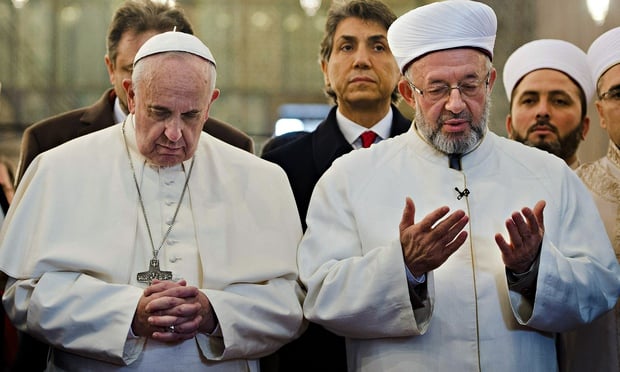
by Haris Raja
Talking to reporters recently, Pope Francis said, “If I speak of Islamic violence, I should speak of Catholic violence.” His statements received some harsh criticism by Islamophobes. In an article published in the Federalist, M.G. Oprea criticized the pontiff for doing“a disservice to his followers, and world leaders, who would look to him for the confidence and moral backing to call out Islamic terrorism and face it head-on.” She went on to make a point that Islamic teachings inherently promote violence unlike Christianity and that Muslim groups commit violence “in the name of religion.”
If one only relies on the sound bites about ISIS, Al-Qaida and the suicide bombers blowing themselves up shouting “Allah-u-Akbar”(God is Great), it is easy to fall into the deception that Islam is the cause of violence in the world today. However, a more through and impartial study of the Quran in its proper context and the right historical perspective is needed to clearly understand this issue.
Neither Islam nor Christianity intrinsically incites violence. In fact, Islam categorically rejects all forms of unwarranted aggression by declaring that there is “no compulsion in religion”. (2:257) Similarly it is written in the Gospels of Mark 12:31, “Thou shalt love thy neighbor as thyself.” Yet, we find that while declaring the first Crusade, Pope Urban II said, “I, or rather the Lord, beseech you as Christ’s heralds to publish this everywhere and to persuade all people of whatever rank, foot-soldiers and knights, poor and rich, to carry aid promptly to those Christians and to destroy that vile race from the lands of our friends. I say this to those who are present, it meant also for those who are absent. Moreover, Christ commands it.”
We also find in 1 Samuel (15:18) that God instructed King Saul to “fight against” the “Amalekites”. Philip Jenkins, a religion historian notes that during the Crusades Catholic Popes declared the Muslims “Amalekites”. Later in the religious wars Protestants and Catholics each believed the other side were the Amalekites and should be utterly destroyed.
Can we call it violence in the name of Christianity?
Talking about the founder of Islam, Oprea wrote “Islam was founded by a man who, in addition to being a religious leader, was also a political and military leader who in his lifetime conquered vast territories in the name of Islam.” Yes, Prophet Muhammad was a political and a military leader as well, however the battles he fought were in pure self-defense and not for the expansion of territories by force. The Muslim population grew through religious persuasion not through coercion. As historian De Lacy O’Leary points out, “History makes it clear however, that the legend of fanatical Muslims sweeping through the world and forcing Islam at the point of the sword upon conquered races is one of the most fantastically absurd myths that historians have ever repeated.” (Islam at the Crossroads)
Karen Armstrong sums it up well, “Killing is always abhorrent, the Quran makes it very clear about that, and the Quran says that it’s always wrong to start a war, to be an aggressor. But persecution is worse than killing. When people have been driven from their homes, or deprived of their basic human rights, when an evil ideology comes into the world, sometimes, regrettably, it may be necessary to fight and sometimes lives will be lost.” (Muhammad: Legacy of a Prophet)
An unbiased study of the Quran and early Islamic history will conclude that there is no legitimacy for groups like ISIS and ideologies like Wahabism that promote the violent spread of Islam today. These groups don’t represent Islam. They prey on the fears and frustrations of a subgroup of Muslims for their own political agenda. Pope Francis rightly pointed out, “It’s not fair to identify Islam with violence. It’s not fair and it’s not true.”
iIt is the responsibility of the peaceful majority of Muslims to openly reject such violent ideologies. The Quran also teaches Muslims to find common grounds with the people of other faiths in the matters of promoting peace and the unity of God. The Quran states, “Say, ‘O People of the Book! come to a word equal between us and you.’”(3:65) As a Muslim, I welcome Pope Francis’ comments and applaud his efforts of building bridges among different religious communities. Let us join hands and collaboration in promoting peace in the world and rejecting all forms of hatred and bigotry. This is a better and more productive way of fighting terrorism in the world today.

